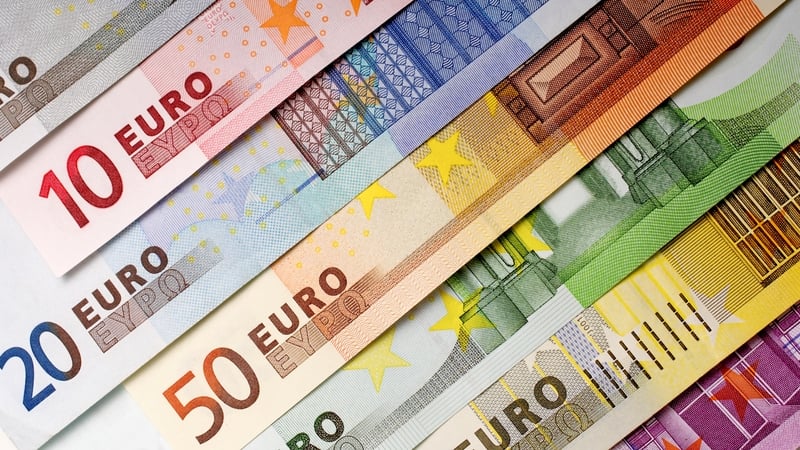The amount of tax collected by the State between January and the end of July was up by 7.5% on the same time last year, when once off payments related to the Apple tax ruling are excluded.
The latest Exchequer Returns show that so far this year, €56.2bn in tax receipts were collected, an increase of €3.9bn on the first seven months of 2024.
All the major tax categories recorded growth last month, reflecting strong economic growth despite the concerns over the impact of tariffs.
When the once-off tax receipts arising from the Court of Justice of the European Union on the Apple tax are excluded, the tax revenue so far this year stands at €58bn, which is €5.6bn or 10.8% higher than the end of July 2024.
€20.3bn of the total came from income tax, which was 3.9% higher than what was collected in the first seven months of last year.
July is not a key month for corporation tax, but excluding the Apple payment, corporation tax take for the year to date is well ahead of last year, up by 14.1% to €14.3bn.
The figure represents an increase of €1.8bn on the number at the end of July 2024.
July is an important month for VAT returns.
The latest Exchequer Returns show receipts of €3.3bn were collected last month, €46m or 1.4% ahead of the same month last year.
It takes the total VAT revenue for the year so far to €14.8bn, which is €0.7bn or 4.8% up on 2024.
Total gross voted expenditure to the end-July amounted to €60.5bn, which is €4.8bn or 8.6% ahead of the same period last year.
The spending is €0.3bn or 0.6% ahead of projections.
“The latest Exchequer figures for July will provide some comfort to the Government in advance of October’s Budget 2026 package, although growth in both income tax and VAT receipts has slowed,” said Peter Vale, Tax Partner at Grant Thornton Ireland.
“After a slight dip in June income tax returns, there will be some concern that the figures for July followed a similar path, up only marginally on the same month last year. With the economy remaining at close to full employment, it would indicate a stabilisation in salaries and wages.”
Mr Vale said: “VAT figures remain healthy, running at 4.8% ahead year to date, although the July returns were slightly off earlier months.It would indicate a slowdown in consumer spending, with sentiment likely not helped by the ongoing tariff negotiations.”
Non-tax revenue to the end of July was €2.3 billion, up by €1.9 billion on the same period last year.
The increase was largely driven by transfers to the Exchequer, mainly interest payments, arising from the Apple tax judgement.
At a headline level, an Exchequer surplus of €4.1 billion was recorded to end-July.
It compares to a surplus of €3.4 billion last year, an improvement of €0.7 billion.
Excluding the once-off receipts arising from the CJEU ruling, the underlying surplus was €0.8 billion, €2.5 billion behind the same period last year.
‘Cannot assume overperformances will continue indefinitely’ – Donohoe
Minister for Finance Paschal Donohoe said the figures show that in terms of tax revenue “we are, broadly speaking, where we expected to be at this point in the year.”
Mr Donohoe said: “The clear exception is corporation tax, which, at least for now, is well ahead of last year.”
“As I have said many times, we cannot assume these overperformances will continue indefinitely, particularly in the context of a deeply uncertain international trading environment,” he added.
“In June, Government transferred some €3 billion in excess corporation tax into the Future Ireland Fund and Infrastructure, Climate and Nature Fund, and by the end of this year there will be €16 billion invested to help us prepare for future challenges,” Mr Donohoe said.
Minister for Public Expenditure Jack Chambers said the Exchequer Returns “are still really positive and shows the strong performance of the Irish economy.”
Mr Chambers said: “Corporate tax is up 14%, excluding the Apple judgment, and also income tax and VAT are all up year on year.”
“So, it reflects the strong consumer demand, and the overall performance of the Irish economy is still positive, notwithstanding the wider risks that we have,” he added.

Commenting on the 14.1% jump in corporation tax during the first seven months of the year, Mr Chambers said there’s “significant volatility around corporation tax”.
“That’s why continuing to put aside a portion of that corporation tax into the Future Ireland Fund and Infrastructure, Climate and Nature Fund is really important, so Ireland has fiscal buffers to manage that volatility,” he said.
Speaking to RTÉ News, he said the increase in corporation tax “is positive and shows the strong base of business and investment and enterprise in the Irish economy”.
“But we know the volatility and the global risk around that and ensuring we have those fiscal buffers and committing to them is really important as part of our medium-term fiscal framework,” he added.
On the spending overruns, Mr Chambers said there has been “a moderation in the increased level of spending year on year” when you compare 2024 overall expenditure to 2025.
“The significant growth in public expenditure has been driven by capital expenditure in the economy, particularly on the government’s investment in housing expenditure, the single biggest issue that we want to invest in,” he said.
Mr Chambers said the Government is “looking at further tools to moderate public expenditure, and that’s important in the medium-term expenditure framework that we’re developing”.
He said while spending is only marginally above profile, “we want all government departments to manage their expenditure in line with what they were given as part of the budget last year”.
Exchequer figures ‘unusually strong’
Mr Vale said July is typically not a big month for corporation tax receipts but he said the figures for the month “were unusually strong, approximately four times the amount collected in July 2024, albeit from a low base”.
He said the year-to-date figures are also impressive, running at 14.1% ahead of 2024, after stripping out exceptional payments.
“The exceptional July corporation tax figures further underline the volatility in corporation tax returns and our reliance on a small cohort of taxpayers,” he added.
“Normally, we would expect any new tariffs, in particular pharma or semiconductor-related, to adversely impact future corporation tax returns. However, with so much volatility in the numbers, it is incredibly difficult to predict the future trajectory of corporation tax receipts,” Mr Vale said.
Head of Tax at Deloitte Ireland Daryl Hanberry said VAT returns in July are an important bellwether of consumer confidence.
He said the continued rise of VAT receipts is “a positive sign of resilience in consumer spending despite an uncertain trading environment”.
“All things being equal, higher VAT receipts tend to reflect more money being spent in the economy at a particular time and that’s what we’re seeing today.
“It is also supported by income tax receipts rising and corporation tax remaining high,” he added.
Tax Partner at Baker Tilly Ireland Brendan Murphy, said the exchequer fundamentals are strong, which he said “is a good position for the Finance Minister to be in ahead of Budget 26”.
“However, there remains substantial uncertainty around the impact of tariffs on the economy and in these circumstances we believe strong consideration should be given to a more conservative Budget package,” he said.
Mr Murphy said the corporation tax returns are “clearly welcome even if they underscore the volatility of this tax heading.”
“The true impact of the new global policy regime on these receipts is unlikely to be seen until 2026, when most companies will make their payments for the 2025 financial year,” Mr Murphy added.
He said that in the current inflationary context, growth of 1.4% year-on-year in July VAT receipts is “a solid, if unspectacular performance”.
“As such it may not materially sway the 9% VAT rate debate in one direction or another.”
The Irish Fiscal Advisory Council said the latest figures on the public finances show that “spending continues to grow quickly,” Mr Murphy said.
IFAC said current spending is up 7.1% so far this year.
The budgetary watchdog said spending is “rising particularly quickly in Education, Children and Justice, with those combined areas seeing spending up 11.1%”.
“Budget 2025 only set out growth of 2.5% for these areas. The Summer Economic Statement revised up Government estimates of current spending for this year by €1 billion. It appears current spending will exceed this revised forecast of spending,” IFAC added.




